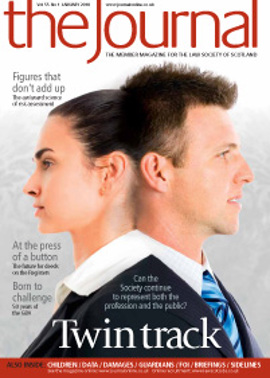Scottish Solicitors' Discipline Tribunal
Section 42A appeal – Douglas Peters
An appeal under s 42A was made by Douglas Peters, solicitor, Falkirk (hereinafter referred to as “the appellant”). The Tribunal found that the service provided to the lay complainer by the appellant in respect of head of complaint 3 (delay in taking Ms A’s evidence by video as requested on 2 October 2005 despite being advised that her cancer was terminal) did not amount to inadequate professional service; quashed the finding of inadequate professional service in relation to head of complaint 3; varied the determination in respect of payment of compensation and directed that the appellant pay the lay complainer compensation in the sum of £1,300; varied the determination in respect of abatement of fees and determined that the appellant shall abate his fees by 30% and directed the appellant to refund or waive the right to charge fees to that extent.
The Tribunal considered that it was unfortunate that the appellant did not respond to the lay complainer’s letter of 2 October 2005 until prompted by the lay complainer’s phone call on 13 October 2005. However the letter of 2 October 2005 did not give an estimate of life expectancy and the delay was only a period of 11 days. After this the Tribunal did not consider that the appellant delayed in dealing with matters. The Tribunal did not consider that the appellant could be criticised for not giving an estimate of life expectancy in his application to the Scottish Legal Aid Board, as the report from the doctor did not contain this. The appellant quite properly sent the doctor’s report with his application. The Tribunal considered that the appellant’s delay between 2 and 13 October 2005 was certainly not good practice, but did not consider that it was sufficiently serious to amount to inadequate professional service.
The Tribunal did not accept the appellant’s submissions in respect of the abatement of fees only being appropriate in respect of the services that were inadequate. In the Tribunal’s view, the Act clearly allows for an abatement of fees in respect of the service provided but the amount of any abatement of fees will reflect how much of the service was inadequate and what effect this had on the overall provision of the service. The Tribunal considered it unfortunate that the Society did not provide more detailed reasoning as to why it chose a figure of 35%. The Tribunal did not consider that it had sufficient information to substitute a different figure. However given that there were seven heads of complaint in respect of which a finding of inadequate professional service was made and that the compensation and the abatement of fees were awarded in respect of all seven, and given that the Tribunal had quashed one of the heads of complaint, the Tribunal considered it reasonable to reduce the compensation and also the abatement of fees by one seventh. The Tribunal made no award of expenses.
Steven Brown
A complaint was made by the Council of the Law Society of Scotland against Steven Brown, independent qualified conveyancer and independent executry practitioner, Scottish Conveyancing Services, 297 Main Street, Wishaw, Lanarkshire (“the respondent”). The Tribunal found the respondent guilty of professional misconduct in respect of his failure to advise his client about a conflict of interest, his acting for his client where there was a conflict of interest between him and his client in two respects, namely a potential claim for damages for professional negligence and in relation to his personal interest in the purchase by him from his client, and his failure to issue a terms of business letter as required by rule 12 of the Independent Qualified Conveyancers (Scotland) Regulations 1997. The Tribunal censured the respondent and fined him in the sum of £1,500.
It was clear that the respondent accepted the rules and that he had acted in breach of the rules. The 1997 Regulations are there to prevent potential risk. The respondent acted in a conflict of interest situation in the two respects mentioned. The Tribunal however accepted that the respondent was trying to put his client back in the position that she would have been in before. The Tribunal also accepted that the respondent was trying to keep his client happy and had the right motive. It was clear to the Tribunal that the complainer had not complained about the deal that she received but only about the delay, and that the complainer was not in any worse position and the deal that she had achieved was not unreasonable. The Tribunal however considered that it was an error of judgment for the respondent to act in the way that he did. The Tribunal also took into account the fact that the respondent had pled guilty to the complaint and co-operated with the Society’s fiscal. In the whole circumstances the Tribunal considered that a censure plus a fine of £1,500 was sufficient penalty.
In this issue
- Forward thinking
- Renewal of transitional guardianships
- End the navel-gazing
- Who speaks for lawyers?
- Reasons to be hopeful
- The full picture
- Hearing and speaking
- Law of unintended consequences
- More prejudicial than probative?
- One giant leap
- If the cap fits
- Half a century of strife
- From the Brussels office
- Law reform update
- Send in the SaaS
- Ask Ash
- Words and sentences
- Two in one
- Enough to turn you to drink
- Uncertain security
- Protections with legs
- Working for the estate
- Home defences
- Splitting from the taxman
- Scottish Solicitors' Discipline Tribunal
- Website review
- Book reviews
- Route to freedom
- Steady as she goes is market forecast






